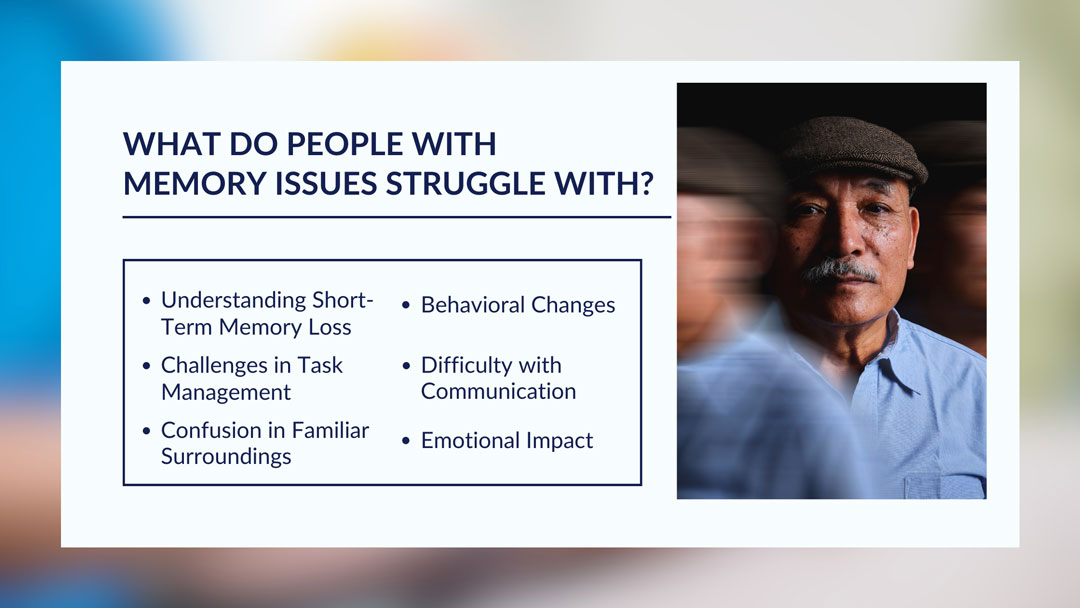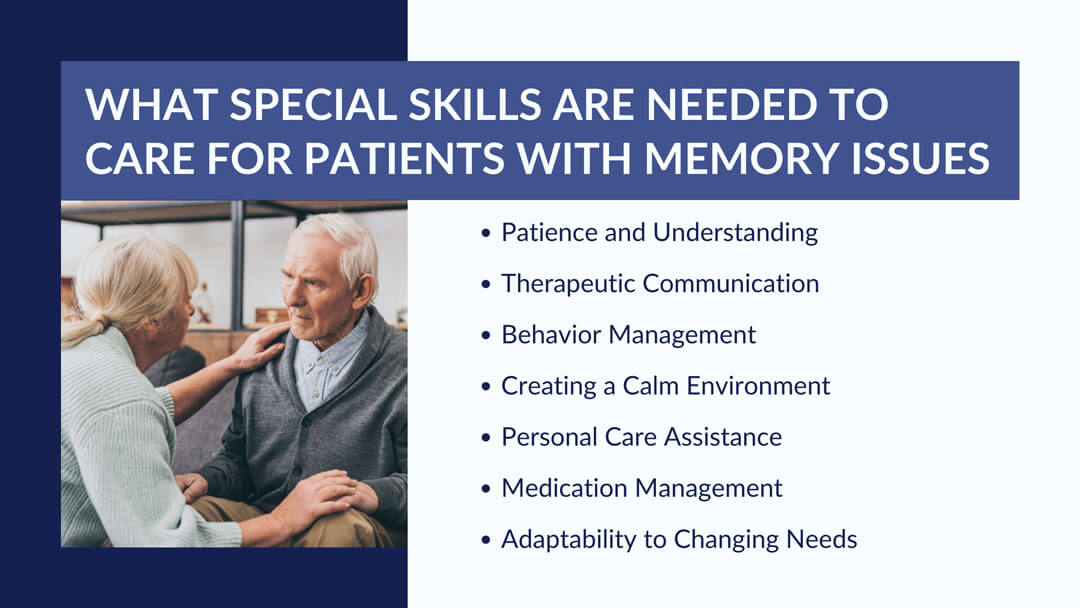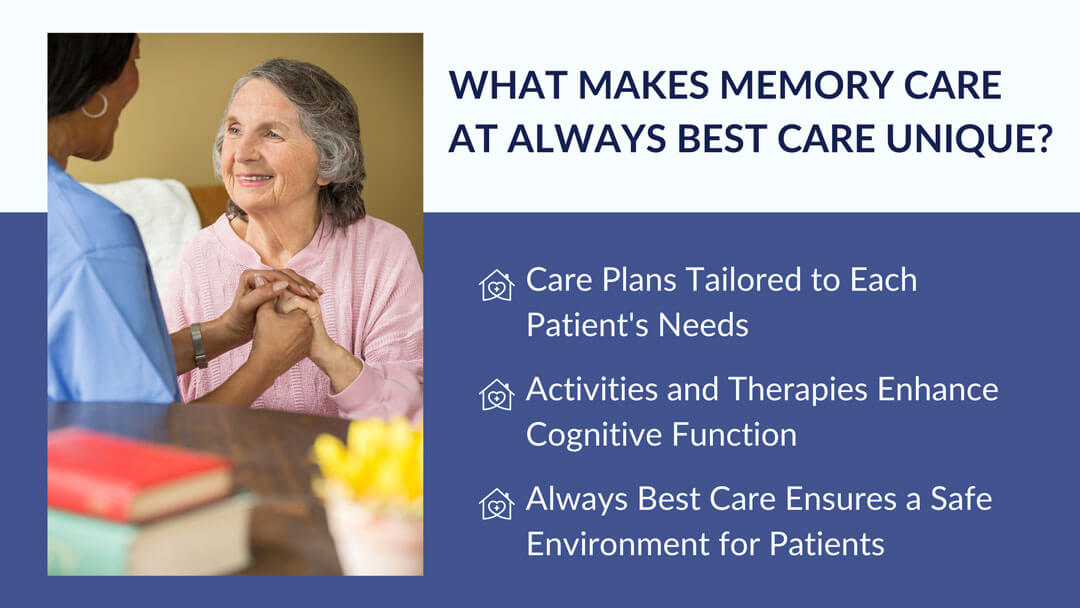Always Best Care: Leading the Way in Memory Care in Baton Rouge, LA

Finding the right support and expertise in memory care is crucial for enhancing the quality of life for those with memory-related conditions. At Always Best Care of Baton Rouge, we are dedicated to leading the way in providing exceptional memory care services.
Our approach is rooted in a deep understanding of the challenges faced by individuals with memory issues. We are committed to offering personalized, compassionate care that addresses each patient’s unique needs.
Table of Contents
What Do People with Memory Issues Struggle With?

Memory issues can profoundly affect everyday life, making ordinary tasks feel overwhelming. Here, we’ll break down the everyday struggles faced by those dealing with memory-related conditions like Alzheimer’s and other forms of dementia.
Understanding Short-Term Memory Loss
One of the most noticeable signs of memory problems is short-term memory loss. This can mean forgetting recent conversations, misplacing items frequently, or not remembering appointments.
Such moments are more than just momentary forgetfulness; they can significantly disrupt daily routines and increase dependence on others for managing everyday tasks.
Challenges in Task Management
For someone experiencing memory difficulties, organizing their space or even their day can feel like navigating a labyrinth.
Routine activities like paying bills, cooking, or dressing can become complex tasks requiring more time and effort. This constant struggle often leads to frustration and may require adaptations to maintain independence.
Confusion in Familiar Surroundings
It’s particularly disorienting when familiar places start to seem strange. Individuals with memory issues might feel lost in their own homes or neighborhoods, a situation that can trigger anxiety and fear. This kind of confusion is distressing and can pose safety risks.
Behavioral Changes
Changes in behavior are common and varied, ranging from withdrawal from social activities to unexplained irritability or aggression. These alterations to usual behavior can strain relationships, as loved ones might struggle to understand or cope with these new moods.
Difficulty with Communication
Expressing thoughts becomes increasingly challenging, affecting how someone with memory issues communicates. They might struggle to find the right words, repeat questions, or not be able to follow along in conversations. This barrier can lead to feelings of isolation and misunderstanding.
Emotional Impact
Living with memory issues is often accompanied by emotional distress. The frustration of not being able to remember or perform daily tasks as before can lead to sadness, anger, or even depression. This emotional toll affects the individual and their family and friends, who may sometimes feel helpless.
What Special Skills Are Needed to Care for Patients with Memory Issues?

Caring for individuals with memory issues is a delicate task that demands a special blend of skills and personal qualities. Here’s a closer look at the essential skills caregivers need to provide effective and compassionate care.
Patience and Understanding
Memory loss can lead to slow, repetitive, or unpredictable behaviors. Caregivers need immense patience to handle situations without frustration or irritation.
Understanding the nature of these behaviors as symptoms of the condition rather than personal traits is crucial. This empathy allows caregivers to maintain a supportive attitude throughout the challenges.
Therapeutic Communication
Effective communication is vital in memory care. Caregivers must master therapeutic communication techniques, which involve speaking slowly and clearly and using simple sentences.
This approach also includes using non-verbal cues such as body language and facial expressions to convey messages gently and reassuringly.
Behavior Management
Individuals with memory issues may exhibit behaviors such as aggression, wandering, or anxiety. Caregivers must be skilled in behavior management techniques to safely and respectfully manage these challenges. This involves identifying triggers, de-escalation techniques to calm the patient, and distraction methods to refocus their attention.
Creating a Calm Environment
The ability to create a calm and homelike environment is vital. This includes managing the physical space to minimize confusion and designing daily routines that provide a sense of structure and security. A tranquil setting helps reduce anxiety and agitation among patients, making them feel more at ease.
Personal Care Assistance
As memory issues progress, the ability to perform personal care tasks independently can diminish. Caregivers need skills in assisting with daily activities such as bathing, dressing, and grooming to maintain the patient’s dignity and comfort.
Medication Management
Proper medication management is crucial. Caregivers must ensure that medications are administered correctly and on time to manage symptoms effectively and avoid complications. This responsibility also includes monitoring side effects and communicating concerns to healthcare professionals.
Adaptability to Changing Needs
Memory conditions can progress unpredictably, and what works one day may not work the next. Caregivers must be observant and flexible, able to recognize changes in condition and adapt care plans quickly and effectively. This adaptability ensures that the care provided meets the patient’s evolving needs.
These specialized skills are essential for the well-being and safety of patients and for fostering a nurturing environment that supports their quality of life.
What Makes Memory Care at Always Best Care Unique?

Always Best Care sets itself apart by integrating personalized care with cutting-edge training and compassionate staffing. Our memory care facilities in Baton Rouge are designed to provide a homely atmosphere that reduces stress and promotes well-being.
We incorporate evidence-based approaches tailored to enhance cognitive health and emotional well-being, making our care model one of the most progressive in the region.
Care Plans Tailored to Each Patient’s Needs
We believe everyone is unique, and their care plan should be, too. At Always Best Care, we collaborate with healthcare professionals, patient, and their families to develop comprehensive, individualized care plans.
These plans address everything from dietary preferences and physical health needs to cognitive stimulation and social interaction, ensuring a holistic approach to memory care.
Activities and Therapies Enhance Cognitive Function
Our memory care program includes various activities and therapies to maintain or improve cognitive function. These include structured activities like memory games, puzzles, and art therapy, as well as physical exercises known to aid cognitive health.
We also offer music and pet therapy, which have been shown to improve mood and increase social interaction among memory care patients.
Always Best Care Ensures a Safe Environment for Patients
Safety is a paramount concern in memory care, and at Always Best Care, we take extensive measures to ensure a secure environment for our patients.
Our facilities have advanced security systems and features designed to prevent wandering—a common and dangerous issue among those with memory issues. Staff are trained to oversee and assist patients effectively while respecting their independence.
What Training Do Caregivers Receive for Memory Care?
Caregivers at Always Best Care undergo rigorous training specifically designed for memory care. This includes foundational training in dementia and Alzheimer’s care techniques, ongoing education on the latest memory care practices, and emergency response training.
Our staff are equipped to manage daily care needs and handle complex situations that may arise with compassion and competence.
How Can Families Stay Involved in Their Loved One’s Care?
Always Best Care encourages family involvement through regular updates, family meetings, and care planning sessions.
We understand the importance of family in the care process and provide numerous opportunities for loved ones to engage with and contribute to their family member’s care. This partnership approach ensures that families are always informed and have a voice in their loved one’s care.
What Resources Are Available for Families of Memory Care Patients?
We provide families access to various resources designed to help them understand and manage the challenges of memory care. These include educational workshops, support groups, and access to professional advice. Our staff is always available to discuss concerns and provide guidance based on their professional expertise.
Choose Always Best Care for Memory Care in Baton Rouge!
Find us, Always Best Care, at 10455 Jefferson Hwy Suite 110, Baton Rouge, LA 70809, where we provide exceptional care for individuals with memory issues. We prioritize your loved one’s health, safety, and dignity.
Our services stand apart through innovation, compassion, and unwavering commitment to excellence. For more information, contact us at (225) 513-8656 and discover why our memory care services are the best choice for your loved one.





